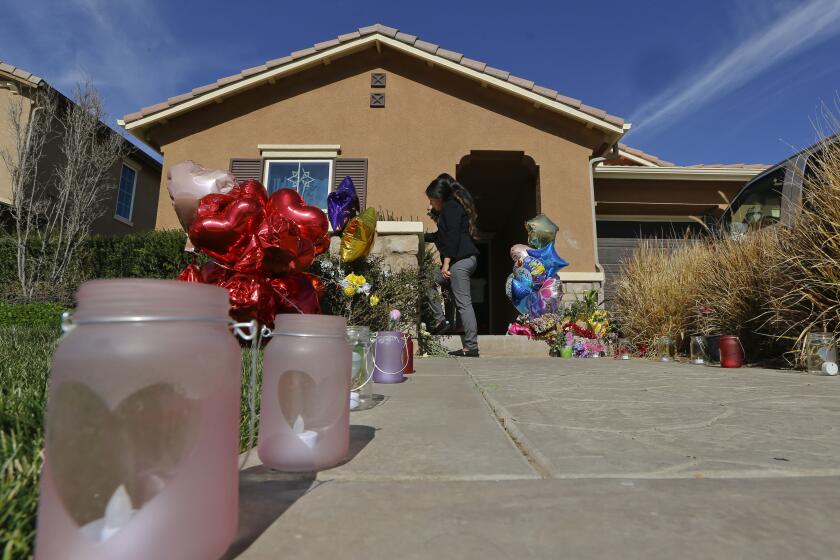City Hall red tape takes the cake
A mom-and-pop bakery called Delilah. Sweet little neighborhood joint in Echo Park. That’s all Genevieve Ostrander was trying to open early last year, but standing in her way was a monster like nothing she ever could have imagined.
Maybe that old line is true, after all -- the one that says you can’t fight City Hall.
“The first thing they told me was that I needed underground parking,” said Ostrander, who had given up a job as a beauty product publicist to turn her lifelong baking hobby into a business.
Underground parking? For a hole-in-the-wall shop selling pecan pie and banana nut muffins?
Only by her youth (34), sheer spunk and the grace of God did Ostrander beat back the demands for underground parking, but by then she was hearing from other tortured L.A. restaurateurs that it would only get worse. Last summer, at around the time she had hoped to open, City Hall made a demand that reduced her to tears, busted her bank account and nearly broke her will.
She says she was told she’d have to dig up her new brick patio, knock down a wall, dig a gigantic hole and install a grease-collecting contraption the size of a Toyota Camry.
This was required, she was told, because of the city’s FOG (Fat, Oils and Grease) law, and the grease interceptor would cost her between $25,000 and $40,000. Ostrander says she’s pro-environment, and knew the city settled a lawsuit in 2004 by requiring restaurants to catch grease before it clogs sewer mains and sends sewage into storm drains and out to sea.
“But I don’t even fry anything,” said Ostrander, who had already burned through $30,000 and was tapping friends and family for loans.
Moments before curling up in the fetal position, she found the strength to knock on the door of City Councilman Eric Garcetti and beg for help.
“She literally walked into our office crying,” said field deputy Kabira Stokes, who had been through this with other frazzled restaurateurs dealing with sometimes-competing demands from city and county bureaucrats specializing in building and safety, plumbing, wiring, public works, sanitation, health, fire safety and so forth. “She felt daunted by the city, and in many cases it can be a daunting place.”
So I’ve heard.
You’d think the city would bend over backward to help well-meaning entrepreneurs open their doors and kick their fair share into the municipal treasury. The last thing independent eateries need is another disadvantage in competing against the corporate chain restaurants, which have teams of attorneys, architects and engineers to do their bidding at City Hall.
“We are having a nightmare,” said Susie Hastings of Joan’s on Third, which has been trying for two years to expand its gourmet market near 3rd and Sweetzer. Opposition by a couple of neighbors over parking issues has been magnified by a byzantine permit and appeals process, so Hastings has run up a huge tab for attorneys and for rent on unused space.
“Every time you have a hearing, it’s weeks to wait for the results, weeks to wait for someone to appeal, weeks to get back on the calendar to be heard again, and that can be appealed.”
In Eagle Rock, Larkin Mackey says he’s been ready to open a soul food restaurant since January, and he’s losing thousands of dollars as he awaits city approval. He said he’s been to City Hall roughly 50 times trying to sort through conflicting demands from different city departments.
“Sometimes you get different instructions from the same inspector,” Mackey said. “It just depends on how they feel that day.”
Just up the street on Colorado Boulevard, Andre Guerrero offered sympathy. He said the recent opening of his Oinkster restaurant was delayed about seven months thanks to multiple demands that he tear up and redo things like the bathroom sinks.
“One of the problems with these inspectors is nobody wants to take responsibility,” said Guerrero, who also owns Max in Sherman Oaks. “So if there’s any kind of a question that something isn’t completely right, they just don’t sign off on it and they keep passing the buck.”
This comes as no surprise to Jack Kyser of the Los Angeles County Economic Development Corp. Kyser said Los Angeles isn’t nearly as business-friendly as Burbank, El Segundo, Santa Clarita or Long Beach. “If you’re dealing with the Building Department,” he said, “you’ve got to just pray.”
If that doesn’t work, you could call Kyser’s friend Dick Carter, a consultant who has been a sort of ghostbuster for restaurateurs haunted by City Hall ghouls and goblins. Carter, now semi-retired, said Santa Monica, Culver City and West Hollywood put restaurants to the test, too, but the galactic bureaucracy in Los Angeles drives the bravest souls to the brink of madness. Comply with a request, he said, and another inspector will arrive on the scene to proclaim, “No, that’s all wrong.”
Bob Steinbach of L.A.’s Department of Building and Safety seemed surprised by all the grousing, saying “great strides” had been made in streamlining the process, despite understaffing that sometimes causes delays. He said the city can’t cut corners, though, when it comes to wheelchair access and public safety issues regarding electrical work, engineering and plumbing.
Garcetti, however, sees much room for improvement. He said too many city employees are “all about regulations” and weak on customer service, and there’s too little coordination “between and within the departments.”
You shouldn’t need help from a councilman to open a bakery, Garcetti said. He hopes to implement “one-stop shopping” reforms such as those used in other states, where a restaurant owner fills out “one form instead of 21.”
It’ll be too late for Ostrander. But she was rescued by Garcetti’s deputy, who offered what Ostrander calls “small-town help in a big city.” Stokes accompanied her to three meetings at City Hall, whacked a clearing through a forest of red tape, and knocked the grease-trap requirement down to a small receptacle costing just $1,500.
Even at that, Ostrander spent months battling over issues such as the location of the nearest sewer lines, and felt like she was dismissed by City Hall functionaries as a naive amateur who’d gotten in over her head. Instead of running a bakery, her full-time job for nearly a year was the fight to open Delilah, and she ran up a debt of $120,000.
On Jan. 21, a line formed around the corner as the small yellow cinder-block building at Echo Park and Lucretia -- formerly a print shop and a tiny Christian chapel -- opened for business with offerings of sweet potato pie, lemon ricotta muffins, peach cobbler and chewy chocolate chip cookies.
My wife swears by the peanut butter-and-jelly bars and the brownies.
Kabira Stokes says the red velvet cake was worth the wait.
*
More to Read
Sign up for Essential California
The most important California stories and recommendations in your inbox every morning.
You may occasionally receive promotional content from the Los Angeles Times.











